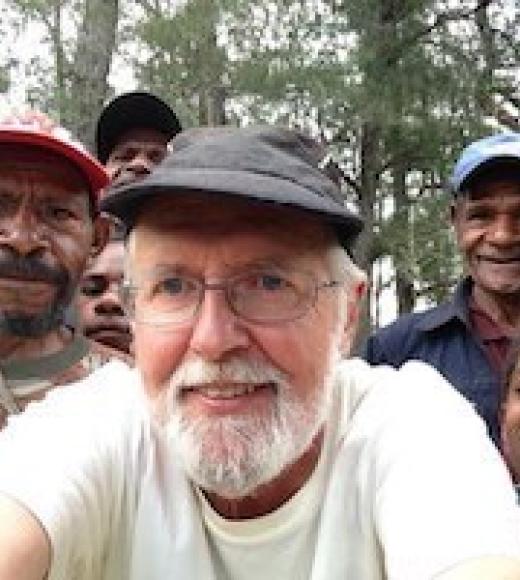
Position Title
Associate Professor Emeritus
EDUCATION
- Ph.D., Anthropology, University of California, Los Angeles, 1975
- M.A., Anthropology, University of California, Los Angeles, 1970
- B.S., Industrial Administration, Iowa State University, 1964
About
After completing my undergraduate studies in metallurgy and management, I had a change of heart and joined the Peace Corps in 1964. While serving as a volunteer in Huancavelica, Peru, a city high in the Central Andes, I became fascinated with the local Quechua culture and decided to pursue a career in anthropology. I entered graduate school at UCLA in 1966, and was drawn to the ecological approaches of J. B. Birdsell and Lewis and Sally Binford. After two summer field schools --- the first in a Yup’ik village in SW Alaska (1967), supervised by W. H. Oswalt, and the second with Otomi Indians in Hidalgo, Mexico (1968), supervised by H. R. Bernard and M. Kenny --- I joined Philip L. Newman on his return visit (1970) to the Awa people in a remote region of the Eastern Highlands of Papua New Guinea (PNG). Since that time, I have made six more trips to the Awa village of Irakia, spanning 43 years (1970-2013).
In 1987, I began a new research project with an even more remote group, the Hagahai, in the highlands of southern Madang Province, PNG. At the time, it was thought that the Hagahai had just recently been contacted by outsiders, a “first contact” scenario. Although this eventually was proven not to be the case, it was true that they had never before been in direct sustained contact with colonial or post-colonial state authorities. I lived with them for some 18 months on three visits between 1987-1991.
In 1973, I obtained a junior professorship at Columbia University and taught undergraduate and graduate courses in ecological anthropology, social change and development, and Pacific Island peoples. In 1977, I came to UCD and remained for 29 years teaching various undergraduate courses (introductory sociocultural anthropology, comparatives cultures, theory in social and cultural anthropology, ecological anthropology, development, Pacific Islands peoples, ethnographic research methods), and graduate seminars (contemporary theory, political ecology, and research design and methods). At UCD, I also was a faculty member of the Graduate Groups in Ecology, Geography, and International Agricultural Development.
I retired from teaching and administrative service positions in 2006, but have continued analyzing and publishing my accumulated field research materials.
Research Interests:
My primary research has concerned how previously independent cultivators and hunter-foragers adjust to their domination by colonial regimes and incorporation into post-colonial states, especially in the islands of Oceania, with emphasis in Papua New Guinea. Following a political ecology theoretical approach, I have focused on changes in subsistence provisioning practices in relatively remote groups as critical resources of land and labor are reallocated to new productive ends. People selectively integrate into the expanding cash economy as smallholder producers, migrant wage laborers, and consumers, but remain immersed in vibrant exchange-based local socioeconomies. Many old cultural beliefs and practices are retained, often with modification, while new ones are generated or borrowed. The supposed “transition” from a local exchange-based noncapitalist society to one dominated by “modern” capitalist markets is a creative, complex process that often remains blessedly incomplete.
Selected Publications:
n.d. Practicing Ethnography in the Mountains of Papua New Guinea. For inclusion in First Fieldwork: Pacific Anthropology, 1960-1985 and Now, Laura Zimmer-Tamakoshi (ed.).
2013 Creating an Alternative Modernity in Rural Papua New Guinea: The Irakia Awa Case. In Engaging with Capitalism: Cases from Oceania, Fiona McCormack and Kate Barkley (eds.), pp. 303-334. (Research in Economic Anthropology, v. 33.). Bingley, UK: Emerald Group Publishing Ltd.
2005 Beyond the “Ipomoean Revolution”: Sweet Potato on the Fringe of the Papua New Guinea Highlands. In The Sweet Potato in Oceania: A Reappraisal, Chris Ballard, Paula Brown, R. Michael Bourke, and Tracy Harwood (eds.), Chapter 14, pp. 137-147. Sydney and Pittsburgh: Ethnology Monographs 19 and Oceania Monograph 56.
2001 Life Without Pigs: Recent Subsistence Changes Among the Irakia Awa, Papua New Guinea. Human Ecology 29(3):259-282. (Revised version reprinted in Human Ecology: Contemporary Research and Practice, Daniel G. Bates and Judith Tucker (eds.), 2010, pp. 155-171. New York: Springer.
2001 The Irakia Awa of Papua New Guinea. In Endangered Peoples of Oceania: The Struggle to Survive and Thrive, Judith M. Fitzpatrick (ed.), pp. 45-59. Westbury, CT: Greenwood Press.
1996 The Legacy of a Highlands Great Man: Sorcery and Politics Among the Irakia Awa. In Work in Progress: Essays in New Guinea Highlands Ethnography in Honour of Paula Brown Glick, Hal Levine and Anton Ploeg (eds.), pp. 43-61. Frankfurt am Main: Peter Lang.
1996 A Tale of "First Contact": The Hagahai of Papua New Guinea. Research in Melanesia 20:103-140.
1990 Hagahai Settlement Pattern and Subsistence, Papua New Guinea. AnthroQuest 41:19-21.
1990 New Wealth and Old Power: Circulation, Remittances, and the Control of Inequality in an Eastern Highlands Community, Papua New Guinea. In Migration and Development in the South Pacific, John Connell (ed.), pp. 97-106. Pacific Research Monograph No. 24. Canberra: National Centre for Development Studies, The Australian National University.
1985 The Commercialisation of Ritual in the Eastern Highlands of Papua New Guinea. Man (n.s.) 20(2):325-340.
1985 "We Must Follow the Fore": Pig Husbandry Intensification and Ritual Diffusion Among the Irakia Awa, Papua New Guinea. American Ethnologist 12(1):119-136.
1984 Awa Women in Papua New Guinea: Exploited Laborers on the Capitalist Fringe. Cultural Survival Quarterly 8(2):36-37.
1984 The Production and Management of Pigs: Husbandry Options and Demographic Patterns in an Eastern Highlands Herd. Oceania 55(1):27-49.
1982 Newman, Philip L. and D.J.B. The Making of Men: Event and Meaning in Awa Male Initiation. In Rituals of Manhood: Male Initiation in Papua New Guinea, Gilbert L. Herdt (ed.), with an Introduction by Roger M. Keesing, pp. 239-285. Berkeley: University of California Press.
1981 Village Agriculture and Labor Migration: Interrelated Production Activities Among the Ilakia Awa of Papua New Guinea. American Ethnologist 8(1):74-93.
